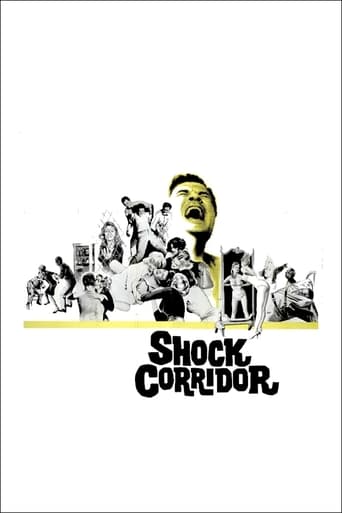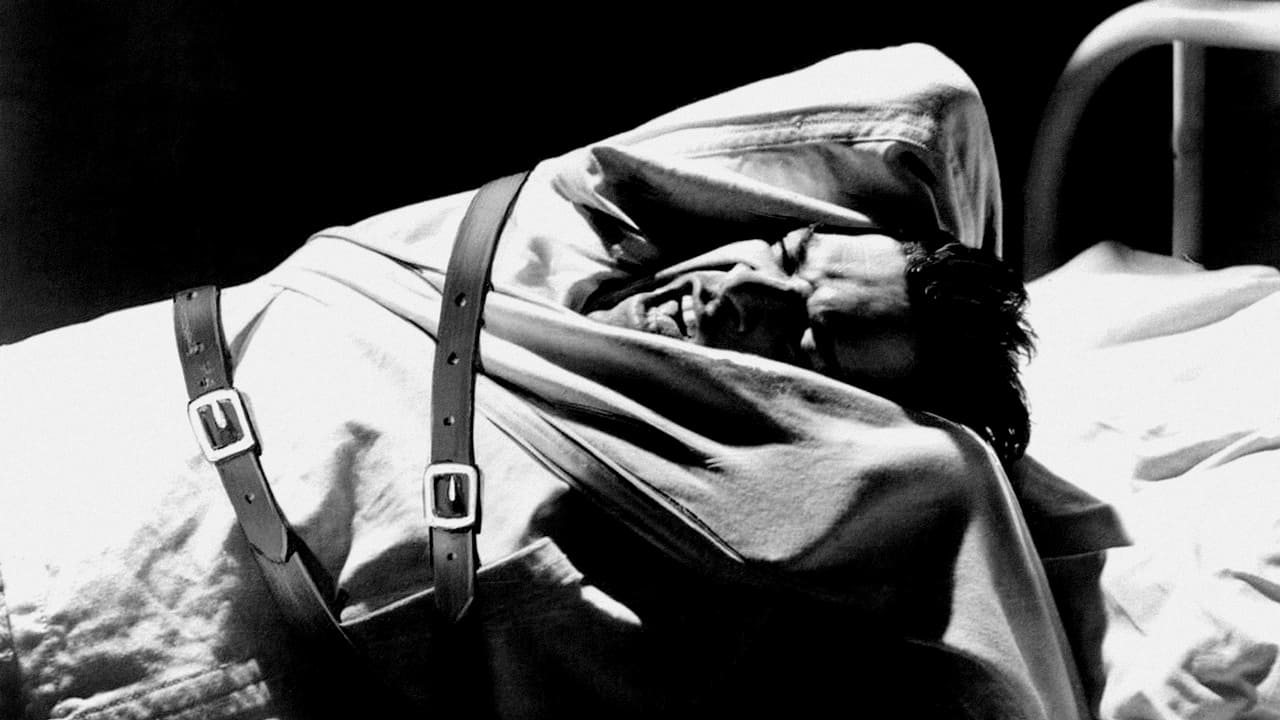SenjoorMutt
'Shock Corridor' is pulp master Samuel Fuller at his best form. Like usually in Fuller's better films, 'Shock Corridor' is much more than it looks on the surface. 'Shock Corridor' tells a story about obsessed journalist Johnny Barret (Peter Breck) who, with the help of his girlfriend (Constance Towers) convinces authorities that he's insane and is locked into mental institution to investigate still unsolved murder that took place inside the hospital. This dream (or more like nightmare) like psychological thriller is filled with tense moments mixed with nice surreal scenes, and big portions of irony - Barret is so obsessed in his work that he starts to lose grip with reality. The whole cast does superb job starting with Peter Breck and finishing with chilling performance of Hari Rhodes as black 'white supremacist'.
ofpsmith
Shock Corridor is a film that Samuel Fuller made with limited sets and a tight budget. But out of these limitations Fuller made a truly great film. Yeah it's cheesy in some parts and some of the acting is pretty bad but it's a film that really get's under your skin. Johnny Barrett (Peter Breck) is a reporter for the paper who has himself committed to a mental hospital to solve a murder. I think this would actually be illegal but so on. Whilst there, Barrett befriends three main patients. Stuart (James Best) an ex soldier who underwent North Korean brainwashing, defected and returned and now believes himself to be General JEB Stuart of the American Civil War. Trent (Hari Rhodes) is an African American college student who was one of the first African Americans to integrate a Southern University, but was broken by racism and now believes himself to be a member of the Ku Klux Klan. Boden (Gene Evans) was a brilliant scientist who was driven insane by the knowledge of nuclear weapons and now has the mental capacity of a six year old. Martin Scorsese said that Stuart, Trent, and Boden represent the insanities of war, racism, and nuclear weapons respectively and I think that that's what Fuller's intentions were. Scorsese also pointed out that Fuller was showcasing in these characters that the United States had become like an insane asylum. I recommend Shock Corridor though I must point out. It is not for the faint hearted.
moonspinner55
Samuel Fuller wrote, produced and directed this "expose" on mental institutions, with newspaper reporter Peter Breck having himself committed in order to crack a murder case from behind asylum walls. High-pitched, 'hard-hitting' potboiler both fascinates (because of the compelling milieu) and repels (because of the creaky, warhorse clichés and irresponsible melodrama). Breck isn't a strong enough or interesting enough actor to carry such a heavy load, and he's not helped by the mediocre supporting cast. Fuller also helmed the photography for the color hallucination sequences, which certainly break up the visual monotony but are ultimately silly instead of enlightening--much like the picture itself. ** from ****
seymourblack-1
Samuel Fuller's experience as a crime reporter and pulp novelist are very evident in his work as the writer, director and producer of "Shock Corridor". This is a movie which makes a big impact, primarily because of its outrageous plot but also because of its lurid content and its powerful social commentary. Fuller's tabloid sensibilities are clearly intact as he adopts a bold and uncompromising style to deliver the story and his observations about some of the issues which were preoccupying society in the early 1960s.The publicity for the movie was overtly sensationalist and promised its audience a story containing sex, violence, psychos, schizos and men in white coats (one of whom was having sexual relationships with the female patients). Additionally, the central character is seen being straight-jacketed, being given electric shock therapy and being attacked by a group of nymphomaniacs.Fuller clearly has little time for subtlety and this fits perfectly with the needs of a maker of low budget movies and provides his output with a tremendous amount of vibrancy and energy. "Shock Corridor" is ostensibly a murder mystery but the events that take place in trying to solve this particular crime soon take prominence over everything else.Johnny Barrett (Peter Breck) is an ambitious newspaper reporter who's determined to win the Pulitzer Prize and decides to do this by getting himself into a mental hospital as a patient so that he can carry out his own investigation into the unsolved murder of one of the inmates. In order to do this, he's helped by a psychiatrist called Dr Fong (Philip Ahn) who teaches him how to appear sufficiently unstable to be committed to the institution and also his editor "Swanee" Swanson (Bill Zuckert). These two men are enthusiastic conspirators but Johnny's girlfriend Cathy (Constance Towers) who's a stripper and a singer is far more reluctant to be involved.Cathy, however, is soon persuaded to co-operate and posing as Johnny's sister makes the charge that he'd tried to sexually assault her. This leads to Johnny being committed as planned and also to him being able to begin his investigation. There were three inmates who'd witnessed the murder and Johnny's challenge is to get to the truth of what happened by eliciting the pertinent information from these witnesses before his own mental state suffers irreparable damage.Peter Breck effectively portrays the aggression and single mindedness of Johnny Barrett who was desperate for recognition and the prestige of being a Pulitzer Prize winner. His determination to achieve this goal was commendable but the means by which he planned to do so was fraught with a level of danger which Johnny ignored because he was supremely confident that his own sanity wouldn't be threatened by being institutionalised. This error of judgement predictably meant that any success that he achieved came at a very high price.The three witnesses that Johnny conversed with all displayed bizarre behaviour and were all victims of traumas that were strongly linked to social issues of the period (i.e. the arms race, racism and anti-communism). Fuller's use of the quotation "Whom God wishes to destroy, he first makes mad" (Euripides) is interesting as it clearly refers to the predicaments of the patients in the asylum but also infers that as their problems were triggered by manifestations of society's madness, it's not only the patients who stand to be destroyed.


 AD
AD





